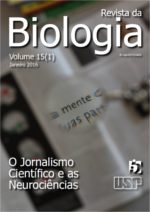Constructing the dependent brain: an analysis of the Brazilian media and of the scientific literature on technology addiction
DOI:
https://doi.org/10.7594/revbio.15.01.05Keywords:
Addiction, video game, internet, neuroimaging, dopamineAbstract
Neuroscience is frequently used as an argument in various debates on mental health, such as the definition of some behaviors as pathological. To understand how this happens in the Brazilian media, we analyzed neuroscientific facts mentioned in articles about a controversial diagnosis: internet and or/video gaming addiction. Of 85 articles located in web searches of seven major press vehicles, 25% made allusions to neuroscience. The analysis of two frequently mentioned facts (the similarity between cerebral alterations observed in drug and technology addictions and the release of dopamine as a mediator of reward and addiction to video games) showed inconsistencies between media claims and the available empirical evidence. However, similar biases were already observable in the scientific literature itself, suggesting that the theory of a “dependent brain” in behavioral and chemical addictions seems to be favored by both journalists and scientistsDownloads
Download data is not yet available.
Downloads
Published
2018-04-23
Issue
Section
Revisão
License
We ensure that our journal does not retain any copyright and that these are exclusive of the author(s) of the text. In that sense, we intend to break any restrictions to the published material and to achieve more intensely our goal of communicating science.
How to Cite
Amaral, O. B., & Junqueira, L. S. (2018). Constructing the dependent brain: an analysis of the Brazilian media and of the scientific literature on technology addiction. Revista Da Biologia, 15(1), 39-49. https://doi.org/10.7594/revbio.15.01.05






